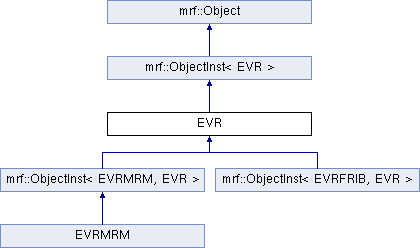Base interface for EVRs.
More...
#include <evr.h>
|
|
virtual std::string | model () const =0 |
| | Hardware model.
|
| |
|
virtual MRFVersion | version () const =0 |
| | Firmware Version.
|
| |
|
virtual std::string | versionSw () const |
| | Software Version.
|
| |
|
virtual std::string | position () const |
| | Position of EVR device in enclosure.
|
| |
| virtual bool | specialMapped (epicsUInt32 code, epicsUInt32 func) const =0 |
| |
| virtual double | clock () const =0 |
| |
| virtual void | clockSet (double clk)=0 |
| |
|
virtual bool | pllLocked () const =0 |
| | Internal PLL Status.
|
| |
|
virtual epicsUInt32 | uSecDiv () const =0 |
| | Approximate divider from event clock period to 1us.
|
| |
|
virtual bool | extInhib () const =0 |
| | Using external hardware input for inhibit?
|
| |
|
virtual void | setSourceTS (TSSource)=0 |
| | Select source which increments TS counter.
|
| |
| virtual double | clockTS () const =0 |
| |
| virtual void | clockTSSet (double)=0 |
| |
|
virtual epicsUInt32 | tsDiv () const =0 |
| | When using internal TS source gives the divider from event clock period to TS period.
|
| |
| virtual bool | interestedInEvent (epicsUInt32 event, bool set)=0 |
| |
| virtual bool | getTimeStamp (epicsTimeStamp *ts, epicsUInt32 event)=0 |
| |
| virtual bool | getTicks (epicsUInt32 *tks)=0 |
| |
Base interface for EVRs.
This is the interface which the generic EVR device support will use to interact with an EVR.
Device support can use one of the functions returning IOSCANPVT to impliment get_ioint_info().
◆ specialMapped()
| virtual bool EVR::specialMapped |
( |
epicsUInt32 |
code, |
|
|
epicsUInt32 |
func |
|
) |
| const |
|
pure virtual |
Hook to handle general event mapping table manipulation. Allows 'special' events only (ie heartbeat, log, led, etc) Normal mappings (pulsers, outputs) must be made through the appropriate class (Pulser, Output).
Note: this is one place where Device Support will have some depth.
Implemented in EVRMRM.
◆ clock()
| virtual double EVR::clock |
( |
| ) |
const |
|
pure virtual |
Find current LO settings
- Returns
- Clock rate in Hz
Implemented in EVRMRM.
◆ clockSet()
| virtual void EVR::clockSet |
( |
double |
clk | ) |
|
|
pure virtual |
Set LO frequency
- Parameters
-
Implemented in EVRMRM.
◆ clockTS()
| virtual double EVR::clockTS |
( |
| ) |
const |
|
pure virtual |
Find current TS settings
- Returns
- Clock rate in Hz
Implemented in EVRMRM.
◆ clockTSSet()
| virtual void EVR::clockTSSet |
( |
double |
| ) |
|
|
pure virtual |
Set TS frequency
- Parameters
-
Implemented in EVRMRM.
◆ interestedInEvent()
| virtual bool EVR::interestedInEvent |
( |
epicsUInt32 |
event, |
|
|
bool |
set |
|
) |
| |
|
pure virtual |
Indicate (lack of) interest in a particular event code. This allows an EVR to ignore event codes which are not needed.
Implemented in EVRMRM.
◆ getTimeStamp()
| virtual bool EVR::getTimeStamp |
( |
epicsTimeStamp * |
ts, |
|
|
epicsUInt32 |
event |
|
) |
| |
|
pure virtual |
Gives the current time stamp as sec+nsec
- Parameters
-
| ts | This pointer will be filled in with the current time |
| event | N<=0 Return the current wall clock time |
| event | N>0 Return the time the most recent event # N was received. |
- Returns
- true When ts was updated
-
false When ts could not be updated
Implemented in EVRMRM.
◆ getTicks()
| virtual bool EVR::getTicks |
( |
epicsUInt32 * |
tks | ) |
|
|
pure virtual |
Returns the current value of the Timestamp Event Counter
- Parameters
-
| tks | Pointer to be filled with the counter value |
- Returns
- false if the counter value is not valid
Implemented in EVRMRM.
The documentation for this class was generated from the following files:

 Static Public Member Functions inherited from mrf::Object
Static Public Member Functions inherited from mrf::Object